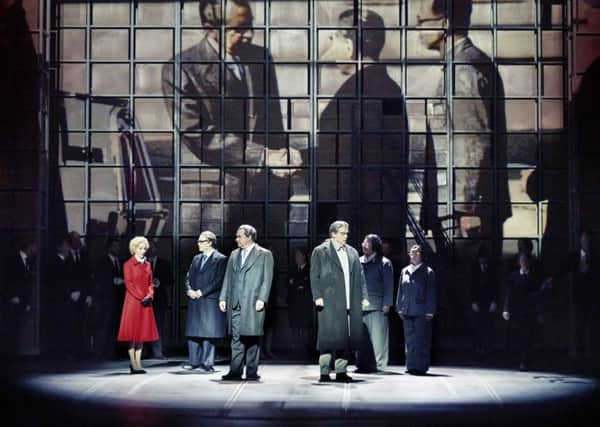Scottish Opera to put operatic flesh on historical bones in Nixon in China


To what extent, then, did John Adams and librettist Alice Goodman apply that principle when, in 1987, they turned US president Richard Nixon’s historic 1972 meeting with China’s Chairman Mao into a full scale opera, complete with onstage presidential Jumbo Jet, premiered in Texas by Houston Grand Opera, and restaged by the same company the following year at the 1988 Edinburgh Festival?
For John Fulljames – in the midst of preparing a brand new co-production of Nixon in China for Scottish Opera, The Royal Danish Theatre and Teatro Real Madrid, which opens in Glasgow this week – so much mystery and myth surrounded the actual political event that writing an opera about it inevitably required creative licence.
Advertisement
Hide AdAdvertisement
Hide Ad“What it does brilliantly is to take a set of politicians who were either lampooned or demonised later in the 1980s, and treat them as serious human beings,” argues the seasoned director. “It explores their tragedy. It allows us to connect emotionally with both the political and the personal.”
He’s right. It’s the human stories that invariably put operatic flesh on historical dry bones, even if that involves judicious conjecture. “The place where opera operates in is not just what you’re doing, but what you’re thinking, what you’re feeling. Those questions of emotional histories, especially in this case, are even more debated and disputed than questions of fact.”
Which is why a story brought so vividly to life by the emotive wash of Adams’ enriched minimalism and Goodman’s linguistic gymnastics (rightly praised at the time by one academic for her ability to weave together “the epic and the vernacular registers of the American language and to turn on a dime, sometimes within a phrase, between the two”) required elaboration of the bare facts.
That has enabled directors like Fulljames to invest their own creative slant on characters whose real thoughts we could only imagine above their straitjacket real-life political persona, from the nervous Nixon and ailing Mao, to the facilitating Henry Kissinger and Chou En-Lai, to their female supports, the shrewd red-coated Pat Nixon and the enigmatically spooky Madame Mao.
There’s that touch of prophetic fantasy in the opera’s histrionic depiction of Mao’s wife, he reckons. “Nixon is a Verdian hero, a lot like Simon Boccanegra, the ageing politician. But she’s a show stealer, like Mozart’s Queen of the Night. We have to ask: what was going on in her mind; what was she trying to communicate to the Americans when she stages this extraordinary revolutionary ballet [Act 2’s The Red Detachment of Women] for the Nixons? We can’t help but watch this now, knowing that she dies – commits suicide? – in prison after Mao’s death.”
And what of her husband, who by 1972 was a seriously ill man, normally visible by then only on ubiquitous posters of him as a younger fresh-faced idealistic deity? One of the most interesting moments in this opera, says Fulljames, is when Mao, “who seems to have been the defender of an old China, admits that it is going to open up, that it is going to change, that essentially he’s failed and that China will not remain a unique place. It will become globalised.” Fact or fiction, the point is remarkably poignant today as we ponder today’s global meddling by China.
What Fulljames never anticipated when asked to work on the opera was the opportunity to play for laughs. “When I met Adams early on, I was expecting to have an earnest conversation about politics, but his principal concern and advice to me was ‘get the humour right’, which, it soon became clear to me, was all about it’s importance in humanising the characters, not about creating caricatures and not about being crude. So Kissinger needing to excuse himself to go to the toilet is deeply human, and it should be funny, but it shouldn’t turn him into a figure who’s lampooned.”
Advertisement
Hide AdAdvertisement
Hide AdUltimately, though, the message is a serious one. “Nixon was a deeply flawed human being who was trying to do something in the world,” Fulljames argues. “In an age today where politics has become so polarised, it’s hard to acknowledge that together we’re trying to achieve something even if we don’t agree on how it’s being done, I think that is why political opera is interesting. It reminds us that politicians are human too.” Even if much of the truth has to be imagined. Ken Walton
Scottish Opera performs John Adams’ Nixon in China at the Theatre Royal, Glasgow, 18-22 February and at Edinburgh Festival Theatre, 27-29 February, www.scottishopera.org.uk